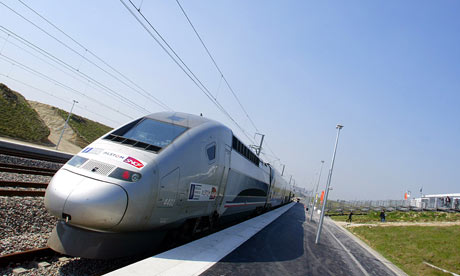The following correction was printed in the Guardian's Corrections and clarifications column, Friday 7 August 2009
In the pdf map attached to this story there is a bar chart, Japan should have been shown as having 2,452km of track enabled for high-speed trains, rather than 1,285km.
Europe's largest high-speed rail operator has predicted that domestic air travel in the UK will lose millions of passengers to a 250mph train service if an ultra-fast network becomes a reality.
The chief executive of the French rail giant, SNCF, said the proposed network could dominate travel from London to all British cities as far north as Glasgow. Guillaume Pepy said the "crowning success" of Eurostar, which now controls 80% of the London to Paris and Brussels market, could be repeated if a replica of the French TGV system arrives in the UK.
"Distances as the crow flies in the UK allow the possibility to link almost all main cities to London [by high-speed rail] in more or less three hours," he said.
Transport analysts argue that rail journeys must be around three hours long to be competitive with airline services on the same routes. Travelling from London-to-Glasgow takes four and a half hours on Virgin Trains and, as a consequence, airlines account for more than eight out of 10 journeys on that route. A TGV-style line would take passengers from London to Scotland in around three hours, according to SNCF.
Pepy's comments, in a presentation at a recent London transport conference, came as airlines dismissed claims by the transport secretary, Lord Adonis, that high-speed rail should replace domestic air travel in the UK. Pepy said: "Three hours' travel time by train means a share between 66% and 70% of the air and rail market." The UK domestic air market accounts for nearly 46 million passenger journeys a year, with many travellers taking flights to Heathrow airport in order to connect with long-distance services.
However, SNCF warned that strong lobbying by regional politicians could result in out-of-the-way routes being built ahead of more deserving destinations. Cities such as Manchester are already launching lobby groups to demand inclusion in the network, but Pepy indicated that some parts of the multibillion euro TGV project were "more politically than rationally driven". Pointing to high-speed routes to further-flung destinations such as La Rochelle and Evian that had been built by the mid-90s, Pepy said a much-needed eastbound line was neglected for more than a decade and not commissioned until 2007.
The SNCF boss also indicated that the taxpayer would have to shoulder the financial burden of a high-speed network in the UK. The state and regional governments are paying nearly three-quarters of the €5.1bn (£4.3bn) price tag for the new line from Paris to Alsace in eastern France. "They want it, they pay for it," said Pepy. The TGV network made a profit of €798m in 2008 and generated a margin, or return on sales, of 18.5% – far higher than the average of around 3% for UK train operators.
Adonis said the government was keen to tap expertise from SNCF and Japan as it planned a high-speed network for the UK. "I am keen to engage closely with international experts on high-speed rail, not least those from France and Japan who have the longest experience," he said. France's TGV network comprises nearly 1,200 miles of track and carried 100 million passengers last year. It is second only to Japan's high-speed system in terms of scale.
However, it is understood that the government has already rejected one approach raised by the SNCF presentation. Pepy mooted doubling the scale of any high-speed network by building four lines rather than two, citing an error in calculating demand for the Paris-to-Lyon route. He said a new line between the capital and France's third largest city will now have to be built, because the original route has proven extremely popular and cannot be doubled from two tracks to four.
The Campaign to Protect Rural England said Pepy's comments heightened already strong concerns that a high-speed route would blight swaths of countryside. " The government needs to find a route that minimises the impact," said Gerald Kells of the CPRE.





